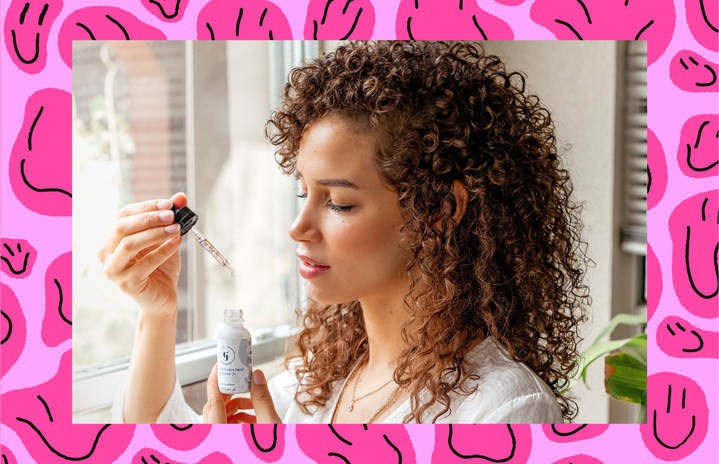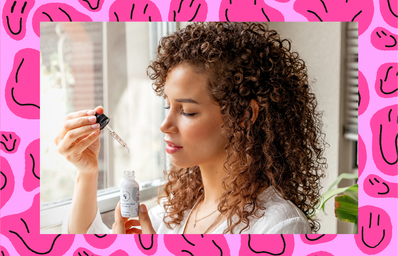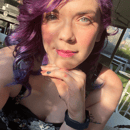The Her Campus National Editors write about products we love and think you’ll love too. Her Campus has affiliate partnerships, so we get a share of the revenue from your purchase. All products are in stock and all prices are accurate as of publication.
There are seemingly hundreds of active skincare ingredients thrown at us every day, from TikTok hacks to “I Tried Its” for minimalist and maximalist skincare routines and beyond, but rarely do these name drops come with reliable guidelines. Sure, this supposed miracle cream you’re peddling sounds great, but what am I risking by putting it on my face? How does it work? What are the side effects?
One of the active ingredients that are often tossed around is retinol, but what exactly is retinol good for? Before you try something new, you’ll want to know if it’s safe to put on your skin, if it’s something everyone should use, or if it’s something better incorporated daily or sparingly. We got the lowdown from board-certified medical professionals to tell you everything you need to know about the benefits (and risks) of incorporating retinol into your skincare routine, from what it even is to how to use it (and how frequently), as well as the precautions to take when including it in your routine and knowing when it’s time to turn to a dermatologist for a second opinion – or a prescription.
Okay, so what exactly is retinol?
Retinol is a form of vitamin A, according to Dr. Michele Koo, a double board-certified plastic surgeon. Your skin cells convert it into its active form, retinoic acid, to stimulate an increase in the production of collagen and elastin, as well as an increased cell turnover rate. “The increased cell turnover smooths skin texture, tightens pores, and minimizes blemish breakouts by clearing the debris in clogged pores that lead to acne breakouts and rough skin texture,” Dr. Koo tells Her Campus.
Dr. Adam Mamelak, a board-certified dermatologist, tells Her Campus that natural collagen production starts to decrease in a person’s mid-20s. “Retinol increases the blood flow to the skin, which will ultimately improve collagen production.”
But for some people, retinol – which is typically available in over-the-counter products – may not be strong enough to accomplish what they’re looking for. According to Dr. Caroline Robinson, founder of Tone Dermatology, that’s where retinoids come in. Retinoids are just a stronger concentration of the same active ingredient and generally need to be prescribed to you by a skincare professional.
The benefits of retinol include acne control and skin texture improvements.
Stronger strength products can help fight stubborn acne, and a lighter strength can be used to maintain clear skin, decreasing both the frequency and severity of your breakouts, according to Dr. Koo.
“Retinol has been shown to help decrease wrinkles and fine lines,” Dr. Mamelak adds. While improvements to acne and skin texture come first, consistent use can also help resolve discoloration, dark spots, and hyperpigmentation. “Wrinkles and fine lines, [however], generally require a few months of treatment to see the full effects.”
What strength do I need?
According to Dr. Robinson, there is no standard strength when it comes to products with retinol/retinoids. Many OTC brands offer 1% concentrations, but prescription strengths can start as low as .005%; it all depends on how they’re formulated. “I often encourage patients with acne to talk with their dermatologist about what is right for their skin…Everyone’s skin has different needs, but it is important to know that there are different types of retinoids that work differently on the skin,” she says. For example, the trifarotene in the AKLIEF® Cream that Dr. Robinson likes to recommend is a low concentration. “But because it’s highly targeted, it is very effective at lower concentrations, which is different than other retinoids,” she explains.
Dr. Koo, who has also founded Private Practice by Dr. Koo, a medical-grade skincare line, says that over-the-counter products can be just as, if not more, effective than prescription products if they’re used consistently. “If balanced and buffered, they can be much less damaging and irritating to the skin,” she says. “However, go slowly and let your skin acclimate to prevent potential skin irritation and damage…Even oily, acne-prone skin may become extremely sensitive and irritated by retinol if it is not blended properly, or [if it’s] used without hydration and vitamin serums.” Dr. Koo recommends using the smallest concentration possible to reach the results you’re looking for. “Stick with that and only advance in concentration if more acne control is needed.”
It’s totally safe to use on your face, as long as you’re careful.
Dr. Koo warns that retinol can affect everyone’s skin differently. “It can be extremely drying and irritating to some skin types, [especially] if the retinol is not balanced with other nutritional ingredients,” she says. “[If] it does not penetrate to the appropriate skin level, the retinol will sit on top of the skin and cause irritation.”
And that rapid turnover rate of skin cells does come with a price, Dr. Mamelak advises. “Skin becomes very sensitive to sunlight, so using products containing enough SPF is mandatory when using retinol,” he says. Dr. Robinson also always recommends wearing sunscreen the day after using a product containing retinol.
Dr. Koo also cautions against using formulas that include phthalates, parabens, any added fragrance, and formaldehyde, and recommends finding products that combine retinol with Marula oil, Ceramide NP, ginger root extract, niacinamide, sodium hyaluronate, hexylresorcinol, phytosterols, and caprylic triglyceride.
Dr. Robinson recommends using product less frequently if you find your skin becoming irritated and speaking with a dermatologist to find the right treatment for your skin. If your skin reacts poorly to a retinol product, Dr. Koo recommends you throw it away immediately. “Cleanse [your skin] thoroughly with a gentle creamy cleanser, [and] use an over-the-counter cortisone [cream].” If the reaction is significant, you should speak with your plastic surgeon or dermatologist.
Do I need to use it every day?
“Everybody needs retinol,” says Dr. Koo. She says that retinol should be used on a consistent nightly basis – and only at night.
Dr. Mamelak typically recommends the use of retinol starting in your late twenties, but warns patients with dry or sensitive skin to be careful with it. He adds that retinol can break down in the sunlight, making before bed the best time to apply it. He suggests starting slowly, applying a low concentration retinol cream every other night – less frequently if necessary – until your skin gets used to it. “The best way to avoid irritation is to start slow,” he explains. “Use a product with a lower concentration of retinol (0.5%, not 1%) and only apply it 1-2 times a week until you get how it affects your skin or you get used to it. You can increase strength and frequency from there.”
Here’s how to use retinol.
You can get retinol (or retinoids) in a cream or a serum. Dr. Koo says, “Use [a] lighter strength retinol all over the face, [and] a tiny dab of a stronger strength on stubborn severe acne spots.”
For those with combination or drier skin, Dr. Robinson recommends cream formulations. “It helps to have the added moisturization from the cream when using [retinol or retiniods],” she says. “A serum or gel, which often penetrates the skin faster, is a better option [for those with oilier skin types].”
Dr. Mamelak explains that serums have a lighter composition than creams and can easily be applied under moisturizers or other skincare products. “If you have oily skin or want to use retinol with another skincare cream, a serum may be a better choice than a cream,” he says. Dr. Mamelak’s favorite retinol product is Retinol Complete 0.5 by Revision Skincare.
If you’re looking to incorporate retinol into your routine, here are a few other over-the-counter products to consider:
Serums:
The Ordinary’s Retinol 0.5% in Squalane ($6)
CeraVe’s Resurfacing Retinol Serum ($20)
Creams:
Drunk Elephant’s A-Passioni Retinol Cream Mini ($28)
Olay’s Regenerist Retinol24 Night Moisturizer ($39)
Expert Sources:
Dr. Michele Koo, M.D., FACS, founder of Private Practice by Dr. Koo
Dr. Adam Mamelak, M.D.
Dr. Caroline Robinson, M.D., FAAD, founder of Tone Dermatology


